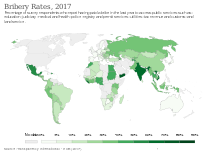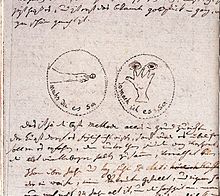Bribery
![]()
This article or paragraph presents the situation in Germany. Help describe the situation in other countries.
Bribery is a qualification of granting advantages to public officials. It is punishable as a criminal offence under Sections 331 et seq. of the Criminal Code by up to five years' imprisonment, and in particularly serious cases by up to ten years' imprisonment (in less serious cases or where an advantage is granted without consideration, a fine may be imposed instead of imprisonment). A public official who accepts a bribe is liable to prosecution for corruption.
Bribery and corruptibility are aspects of corruption.
Bribery is committed by anyone who offers, promises or grants an advantage to a public official (judge, civil servant, pay-scale employee in the public service, etc.), a European public official (public official of the European Union), a person with a special obligation for public service or a soldier of the Federal Armed Forces (for foreign and international civil servants cf. below section 335a of the Criminal Code) for the latter or a third party in return for having performed or in future performing an official act (by which the public official violates his official duties).
This does not cover bribery and corruption in business transactions, which is also referred to as economic corruption. Their punishability is regulated in § 299ff StGB.
Offences listed in the Criminal Code in relation to bribery are:
- Acceptance of advantage (§ 331 StGB)
- Corruptibility (§ 332 StGB)
- Granting of an advantage (§ 333 StGB)
- Bribery (§ 334 StGB)
- particularly serious cases of corruption and bribery (§ 335 StGB)
- Foreign and international staff (§ 335a StGB)
With the Act to Combat Corruption of 20 November 2015 (Federal Law Gazette I p. 2025), provisions of the European Bribery Act (EuBestG) and the Act to Combat Bribery of Foreign Public Officials in International Business Transactions (IntBestG) were incorporated into the StGB. This took account of calls for the equal treatment provisions for the employees of foreign and international authorities to be regulated in the StGB rather than in subsidiary legislation.


Bribery: The Two Sides of a Coin (Debler VI, 327 (p. 140))
Advantage tangible and intangible
The benefit can be tangible measurable, but it can also be intangible. Examples: Monetary payments and gifts or as a bribe a medal, a diploma or adopted by a nobleman for the purpose of gaining a title of nobility.
"Bribery" describes the punishability of one part of such a relationship (giving an advantage in order to obtain an act contrary to one's duty). The other part (acceptance of an advantage in return for the performance of an act in breach of duty) is punished for "bribery".
Tax treatment of bribes
In the past, "benefits in business transactions" (bribes/grease payments) were tax deductible in Germany. These benefits were recorded in some places as "useful expenses" (N.A.). Since September 1, 2002, bribes paid by German companies to foreign business partners have been punishable by law - and thus no longer tax-deductible. Until then, this only applied to domestic business transactions or the bribery of foreign public officials.
Search within the encyclopedia